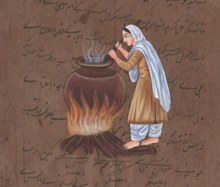| Mata BibiKhivi | |
|---|---|
| ਮਾਤਾ ਖੀਵੀ | |
 Painting of Khivi cooking to prepare langar Painting of Khivi cooking to prepare langar | |
| Born | Khivi Marwaha 1506 Sangar Kot |
| Died | 1586 |
| Spouse | Guru Angad |
| Children | 4 |
| Parents |
|
Khivi (Punjabi: ਮਾਤਾ ਖੀਵੀ) (1506–1582) also referred to as Mata Khivi or Bibi Khivi was the wife of the second Sikh guru Angad, best known for establishing the Sikh tradition of langar (free kitchen).
Early life
Khivi was born in 1506 or 1507 into a Marwaha Khatri family to Devi Chand and Karan Devi in village Sangar Kot near Khadur Sahib. Devi Chand was a wholesale businessman and money lender at Sangar village.
Marriage
Khivi was married to Lehna, a resident of Khadoor Sahib in 1519 at the age of 13, who went on to become second guru of Sikhs and was named Guru Angad. The marriage had been arranged by Virai Devi, the daughter of Chaudhary Takhtmal with both being staunch followers of Guru Nanak.
After the marriage was solemnized, the family shifted from Lehna's ancestral village to Sangar village in the family compound as per the proposal of Devi Chand, father of Khivi. Lehna's father, Bhai Pheru, started a shop in the village of Hari Ke Pattan but the store did not thrive due to hardships. Thus, Pheru moved back to Khadur and restarted his money lending business. When Pheru died in 1526, Lehna took-over his money-lending business. On the instigation of Khivi, the family moved back to Khadur.

The couple had four children; two sons Datu and Dasu and two daughters Anokhi and Amro. Dasu was the elder son of Khivi and Lehna. According to some sources, the couple only had three children (omitting Anokhi). Khivi lived for 30 years after her husband's death to the age of 75.
Langar service
After Guru Nanak's initiation, Khivi continued the system of langar or free kitchen and administered it. It was popularly known as Mata Khivi ji da Langar (Mother Khivi's langar) and she was monumental in institutionalising the Sikh tradition of langar. She was also instrumental in making the Sewa (service) tradition in gurdwaras.
See also
Notes
- Her date of birth is deduced based upon her husband's known birth year due to Khatri marriage customs at that time where the bride was usually three to four years younger than the groom.
- The name of the village is alternatively spelt as 'Sanghar'.
- Bhai Lehna's father's name is alternatively spelt as 'Feru'.
References
- ^ Sarna, Jasveen Kaur (11 July 2017). "5 Sikh Women In History You Should Know About | #IndianWomenInHistory". Feminism In India. Retrieved 12 December 2018.
- ^ "Mata Khivi - SikhiWiki, free Sikh encyclopedia". www.sikhiwiki.org. Retrieved 12 December 2018.
- ^ Singh, Jaspal; Gill, M.K. (1992). "6. Mata Khivi". The Guru Consorts. Radha Publications. pp. 50–63. ISBN 9788185484112.
- Singha, H. S. (2000). The Encyclopedia of Sikhism (over 1000 Entries). p. 126. ISBN 81-7010-301-0. Retrieved 23 January 2015.
- Gujral, Maninder S. "KHIVI, MATA". The Sikh Encyclopedia -ਸਿੱਖ ਧਰਮ ਵਿਸ਼ਵਕੋਸ਼. Retrieved 12 December 2018.
External links
This Sikhism-related article is a stub. You can help Misplaced Pages by expanding it. |